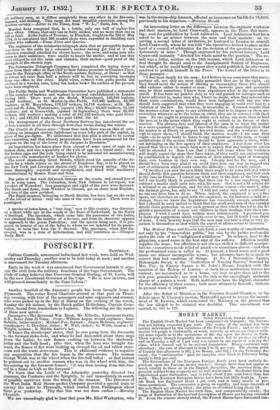An interesting letter on the differences between the engineer workmen
and their masters, by Lord Cranworth, appears in the Times this morn- ing; sent for publication by Lord Ashburton. Lord Ashburton had been asked to be an arbiter between the men and their masters : on re- ceiving a second letter of invitation, he hastened to London to consult Lord Cranworth, whom he was told "the operatives desired to place at the head of a council of arbitration for the decision of the questions now un- fortunately at issue." Though engrossed by his judicial labours, Lord Cranworth instantly "devoted his whole mind to the question." The re- sult was a letter, written on the 10th instant, which Lord Ashburton at first thought he should send to the Amalgamated Society of Engineers, but which, as he could hardly expect they would publish it, he afterwards resolved to publish himself in the Times. The kernel of the letter is in these passages-
" I feel most deeply for the men; for I believe in my conscience that many, perhaps all, not only are most fully persuaded they are in the right, out they would scout the notion of offering or encouraging those who should offer violence either to master or man. But, however pure and peaceable may be their intentions, I know from experience what is the unavoidable result. It has been my painful duty to try and punish for outrages such as I have adverted to, many men who, I have no doubt, when they entered into these trade combinations, would have been indignant with any one who should have suggested that what they were engaging in could over lead to a violation of the law. So, however, it invariably is. I cannot wonder that the masters refuse to agree to any arbitration that is to impose on them any restriction whatever as to the terms on which they are to contract with their men. No one ought to presume to define such terms, anymore than to bind the men as to the terms which they ought to submit to in favour of their masters. The obvious duty and interest of the men is to treat the matter as a mere question of bargain. If once they do that,—if once they allow that the master is at liberty to propose his own terms, and the workman to ac- cept or reject them,—I should think the masters would—I am sure they ought—to be quite ready to listen to any suggestions of the men as to any modifications of the system which should be more agreeable to diem, with- out infringing on the free agency of their employers. I fear from what has passed that there is too much heat now to expect that any temperate advice will be attended to. Sure I am that a time will come when the workmen will deeply regret the steps they have taken, if they really are endeavouring by combination to deprive the masters of their natural right of managing their own business in their own way. I deeply feel for the men, and I should have been very glad if we could have seen our way to suggest any sort of arbitration which could solve the difficulty; but I really cannot. "I recollect you said the men think there ought to be some tribunal which should decide this question between them and their employers, aud that such is the case in France. I cannot say what may be the state of the law there, but lean hardly think it possible that there can be a law regulating what contract a master shall enter into with his men: that is not a fit subject for a tribunal or an arbitration, and for this obvious reason—the master' after
the decision given, has only to say will not enter into such a contract ' ; no one can force him to do so. When, indeed, the employed is not a free agent, not therefore an equal with the employer, as, for instance a child or a woman, there we know the Legislature has reasonably enough interfered. But I should be sorry indeed to think that the adult workmen of this country should claim protection on any such ground as that which has led to the le- gislative protection of women and children in their dealings with their em- ployers. I wish I could have written more satisfactorily. I promised you to make any suggestions which might occur to me, but in truth I can think of none. I only heartily hope that the men may not take a step so very in- jurious to themselves as that which the aspect of affairs seems to threaten."


























 Previous page
Previous page